Raving in Ramallah: How underground music is bringing Palestinians together
The story of the first ever Boiler Room set on Palestinian territory, and what this could mean for the DJs and producers who come from there. By Megan Townsend

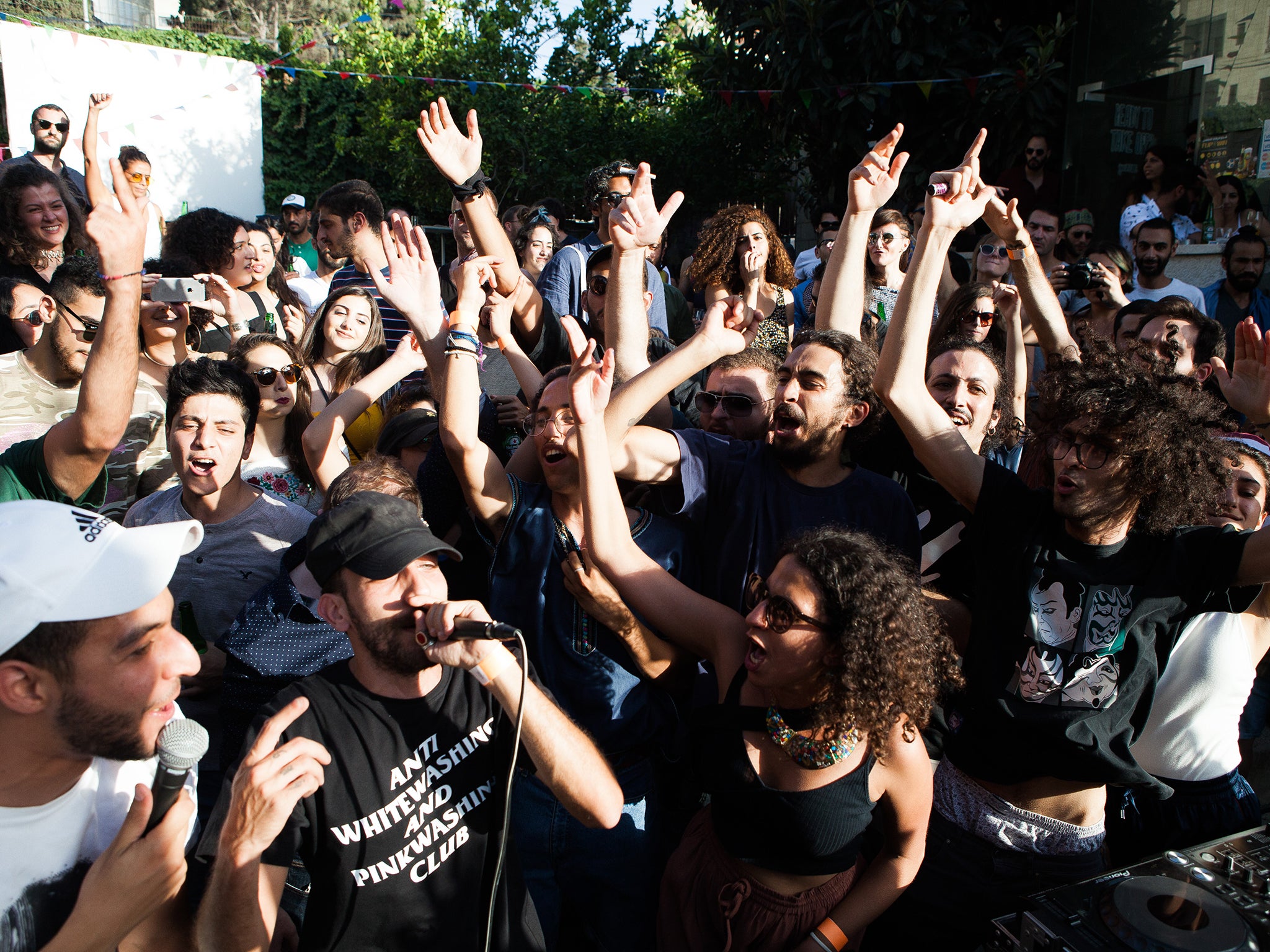
“There aren’t many visitors to Palestine, it’s not that easy for them to come,” says Sama, a pioneering DJ from the West Bank, talking over feverish industrial techno and contrasting footage of quiet cosmopolitan streets. “Everybody feels like it’s a war zone, so there’s no eagerness... It’s not like Berlin, you know.”
Plagued with demolition threats, violent clashes with Israeli authorities and political upheaval, the occupied territories are scarcely out of the headlines. But all that seems far away in this sunny courtyard in Ramallah.
It was a June afternoon and the crowds didn’t seem concerned with the news; this is the first time Boiler Room, the most-watched underground music channel in the world, has broadcast from Palestinian territory. The first set of the day, from the Haifa-based Jazar Crew, sees a brightly dressed and fashionable bunch surrounding the decks. Dancing directly behind the DJs is a woman staring straight at the camera wearing a mesh see-through top and a niqab. It doesn’t look like a war zone. It looks like a really great party.
The decision to broadcast from Ramallah holds huge significance for Palestinians. It acknowledges the depth of talent that comes from the region, and helps fight the stereotype that the West Bank is a conservative, non-secular and terrorism-riddled no-go area. The West Bank broadcast was one of Boiler Room’s most popular transmissions in 2018, with Sama’s set recieving 1.3 million views on Youtube.
But more importantly, it brings together underground musicians from disconnected Palestinian factions: there are those who live in the West Bank, who grow up speaking Arabic and cannot freely travel into Israel, and there are Palestinians from Israel, who often struggle to connect with the West Bank scene beyond watching clips on YouTube.
Throwing a party featuring the best and brightest artists from both regions isn’t just an appreciation of talent, it’s actively building a bridge and reuniting communities that have been separated both geographically and culturally for decades.
“There was a huge cut between Palestinian cities for a long, long time,” says Makimakkuk “but we’re all the same people in the end, we are all Palestinians and we all have the same culture.”
Swigging from beer bottles and taking long, thoughtful draws on cigarettes, the congregation (equal parts male and female) bob along to a range of underground sounds: there’s a little drum’n’bass, a hint of traditional Arabian rababa and some Berlin-esque kick drums, brought together with atmospheric synths that feel alien, yet eerily familiar.
“Many in the west assume that Palestinian culture is very conservative, that men and women don’t mix, they don’t drink or take drugs, they can’t be openly gay, they’re not massive party animals,” says British director Jessica Kelly, who worked with Boiler Room to create Palestine Underground, the documentary follow-up to its debut party in Ramallah. “Of course, conservative values are pretty dominant in the West Bank, but our film shows another reality that’s very different from these stereotypes.”
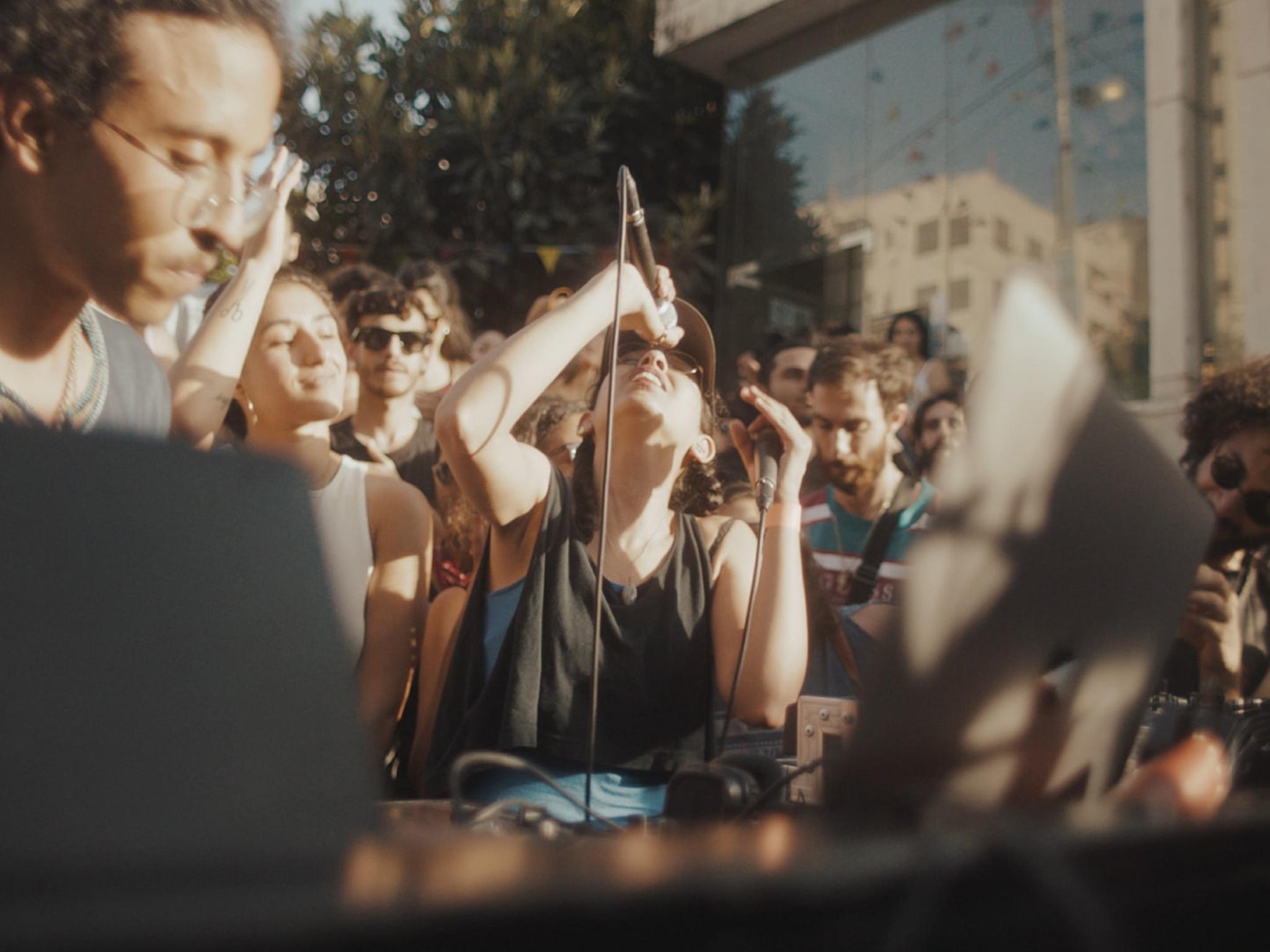
In fact, during the party’s first transmission on Facebook, viewers left a number of comments asking where the set had taken place, insisting that it couldn’t possibly be Ramallah, the most populous city and epicentre of resistance in the West Bank. Arguably the Palestinian cultural capital, Ramallah serves as a hub for fine dining, the arts and nightlife; the city of just 24,000 people has held a wide-ranging influence over Palestinians since long before the Israeli occupation.
Palestine Underground highlights this side of Ramallah. We see busy streets and families rushing across the road in the sunshine rather than tyre fires or mass protests. Ramallah looks like any other pleasant southeast Mediterranean city. The buildings aren’t crumbling, people are going about their everyday lives, there are palm trees and football flags hanging from balconies. Ramallah appears not as a city in turmoil, but as a breeding ground of creativity.
Our culture is slowly being erased… stolen, we’re losing our food, our dress, our music. For me, to reuse sounds from our culture, in a way it’s keeping it alive and fighting back
The scene in Ramallah is restricted by its limited capabilities, with most events at private houses and small venues. In the documentary we see archive footage from Lawain, a tiny Italian restaurant that repurposes itself as a nightclub in the evening. The movement is made up of a small number of passionate individuals and their dedicated followers, who are expressing their long-held fascination with underground culture, as well as using it as an avenue of expression and protest.
Since the mid-Noughties, hip hop has reined in the city as the popular underground sound. The most prominent figure is Muqata’a (Arabic for “disrupt”), a rapper and DJ who has carved out a distinctive sound inspired by the bustling streets.
Muqata’a heads into the city centre, takes out his phone and begins to record the soundscape of the area. Building works, the busy marketplaces with vendors shouting the day’s deals, chatter in barbershops and screaming children on playgrounds. “This is the sound of Ramallah,” he grins, leading us through a winding bazaar. “Our culture is slowly being erased… stolen, we’re losing our food, our dress, our music. For me, to reuse sounds from our culture, in a way it’s keeping it alive and fighting back.”
Muqata’a later fuses the sounds with electronic beats and then raps over the top; a signature “sound of Ramallah” that has become iconic in Palestinian music. Later in the film we see Jazar Crew, a collective from Israel who list Muqata’a as one of their inspirations, excitedly listening from their car. “It’s the drill from Bansa Bansa!” they announce.
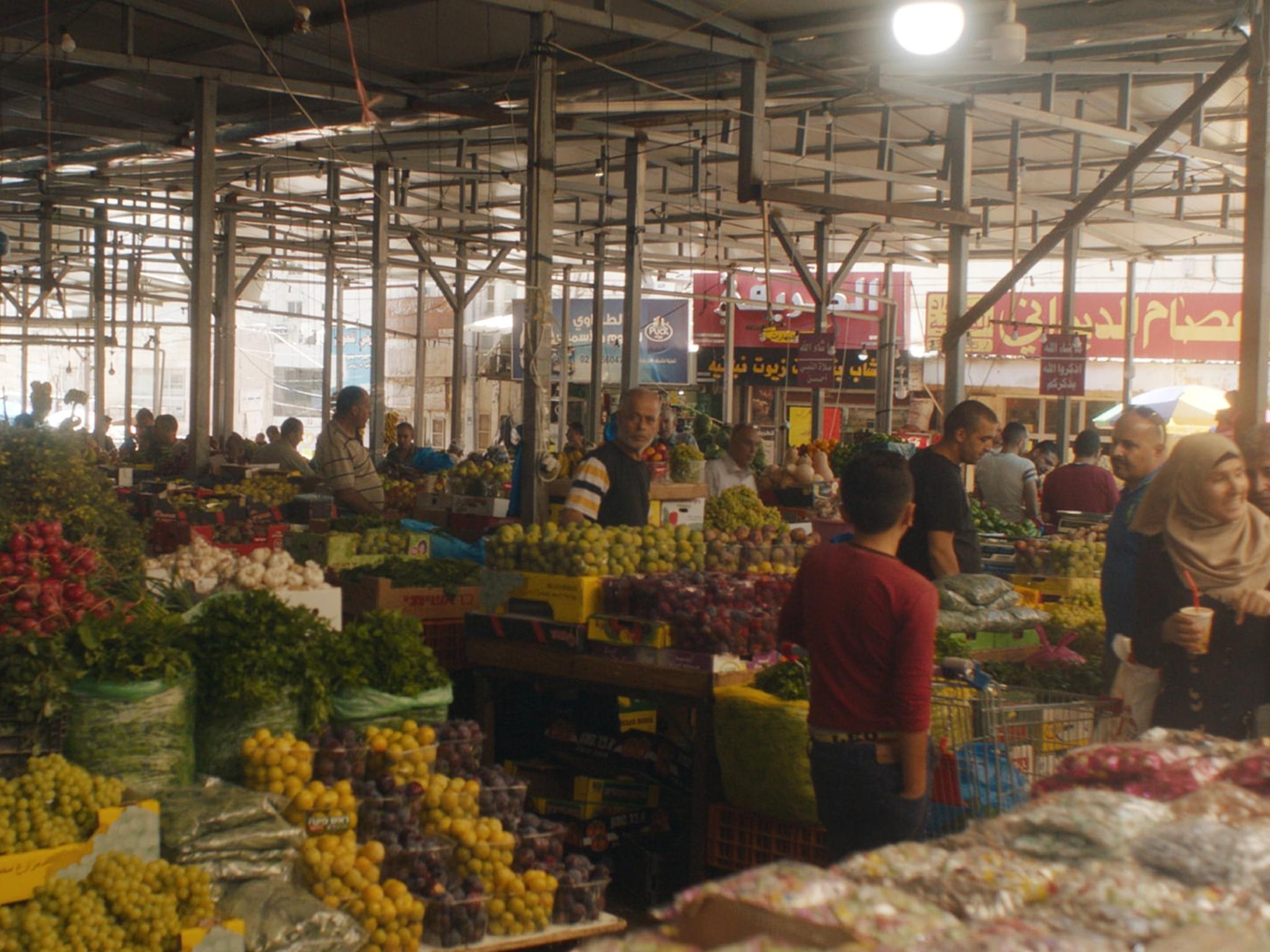
Muqata’a – known as the godfather of Palestinian hip hop – began rapping in 2007 with collective Ramallah Underground, but he felt the music they were making was too far removed from the West Bank, instead more closely linked to the US, and other Arabic hip hop movements. In 2009 he began working with the collective Saleb Wahad including rappers Dakn, Julmud, Haykal, Al Nather and the West Bank’s first prominent female MC, Makimakkuk.
We follow Muqata’a to a dark underground studio, and the group begin to freestyle over a backing track of up-tempo bassline and old Arab vinyl samples. The sound is infused as much with cultural identity as with the lyrics, similar to breakaway movements like UK grime. The artists nod their heads and giggle as they mess up lines, patting one another on the back as they mutter bars. The lyrics aren’t particularly political or defiant, instead they are humorous and self-referential, and full of Ramallah slang. In one scene of the film the whole group jump up and down excitedly as they sing “Ramadan doesn’t come for free!”
Muqata’a, though, insists that the hip hop movement in Ramallah is heavily influenced by politics and the need for change. “We live in a very stagnant political situation so we need this kind of disruption.” The attack on the establishment isn’t performed in a straightforward way, explains Makimakkuk. “It’s subtle,” she nods. “We are resisting by keeping our culture alive, and continuing to create things that are fresh, new and interesting.”
“We’ve had artists from here make techno with Arabic commercial music,” she laughs, “things seem bleak politically but it’s a really exciting time in Ramallah.”
This subtle resistance has gained popularity not only within the West Bank, but with Palestinian communities elsewhere, and – even – with Israelis. Israel’s English language newspaper Haaretz published a piece on the rising popularity of Palestinian hip hop in Tel Aviv, highlighting the rising stars from Ramallah, Nazareth and Haifa.
During the Boiler Room party in Ramallah, Deborah Ipekel, programmer and assistant producer of Palestine Underground, details the amount of positive comments from Israelis. “It must have been really surprising for many people to see a different side of Palestine,” she goes on to say. “One comment said: ‘Much love from Israel! May we all be able to live in peace and harmony with each other. The set is absolutely fantastic, I wish I could one day come to visit Ramallah and even get one rave or two going.’ For the artists from Ramallah, the Boiler Room show is pushing the scene forward. It gives them the motivation to continue what they are doing. They told me the show was one of the most powerful celebrations of their scene to date.”
Saleb Wahad’s influence may stretch far, but they have yet to perform beyond the West Bank. “I’ve never been able to perform in [Israel],” Muqata’a confirms, despite having a career that has lasted well over a decade. “I’ve been trying to perform in Haifa for four years. The Jazar Crew have been inviting me, but it hasn’t worked out because I haven’t got the permission to go there, even though I am originally from there.”
Though centred on Ramallah, the documentary explores the Palestinian underground music scene across Israel, looking at the clubs on the coast in Jaffa and Haifa too. The contrast between the areas is apparent in the freedom of the artists. Whilst Palestinians with Israeli passports can travel into the West Bank with relative ease, and throw parties without much difficulty, travel restrictions on Ramallah residents have affected their ability to spread their music beyond the city, and to communicate with Palestinians outside of the territory.
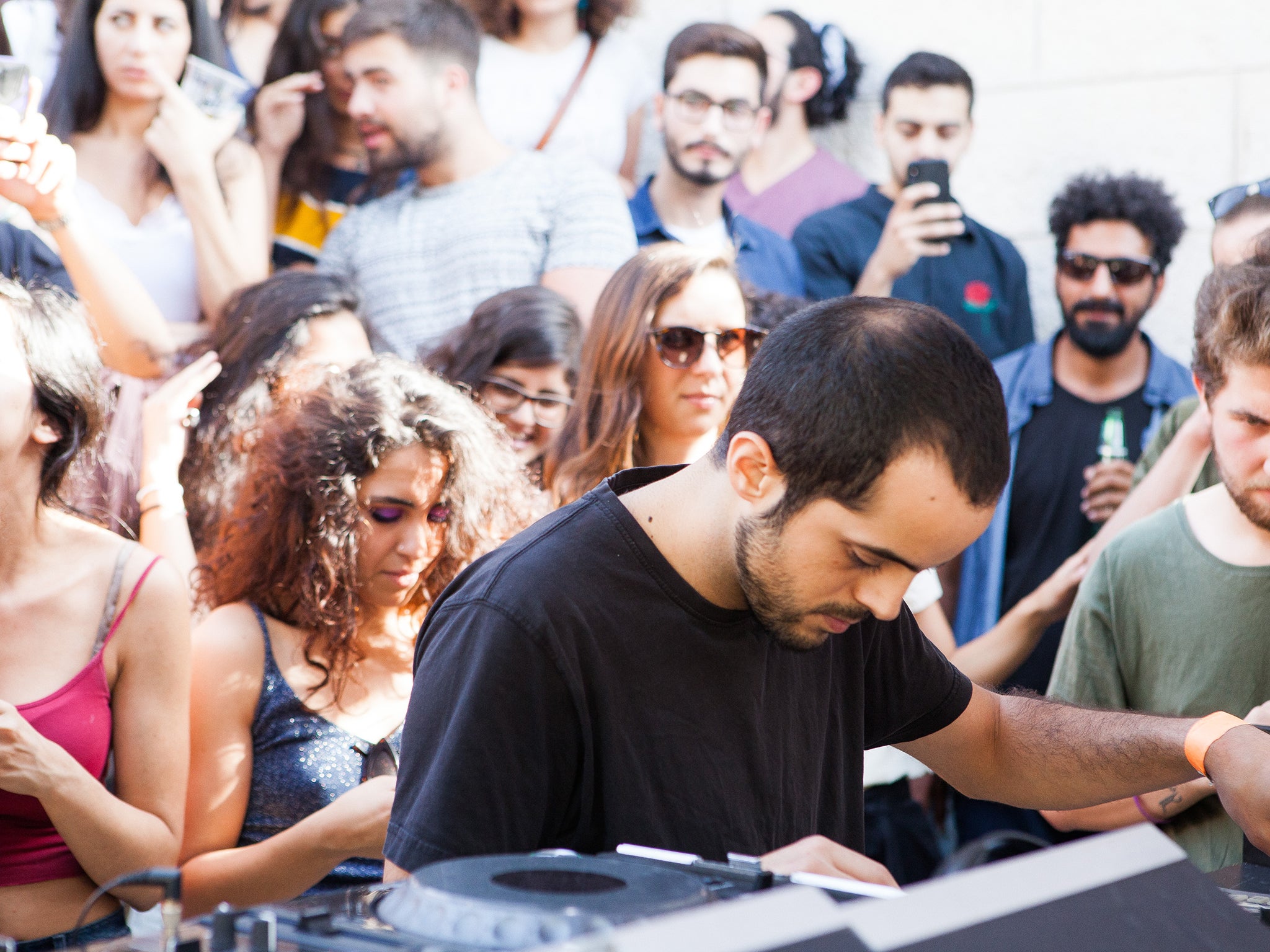
Some 1.8 million Palestinians live in Israel, with Haifa, a city on the north coast, home to one of the largest Palestinian communities. The city is fun and vibrant, a mix of Tel Aviv and Jerusalem. Significantly more peaceful than its neighbours, it’s known for being a relative haven for the coexistence of Jewish people and Muslims.
This doesn’t stop Palestinians feeling isolated from club culture, which is why Jazar Crew started to throw their own parties, to provide safe spaces for Palestinian youth away from the prying eyes of conservative Palestinians and Israeli authorities. Made up of friends Ayed, Reojeh, Riyad and Hilal, Jazar Crew began due to the lack of nightlife on offer for Palestinians.
“There is nothing for us, as Palestinians living in Israel,” says Ayed, rolling a joint on the table in his home. “Whenever we used to go out to the clubs we felt like outsiders. After a few years we realised that OK, let’s stop being consumers, let’s be producers.
The moment you see a DJ from Ramallah here in Jafar, it rings a bell for people. It makes them feel like the borders don’t matter
What follows is footage of the friends taken from their own personal party archive. We see he group hauling around sound systems and decks into remote parts of the desert, playing beats similar to trap, and drum’n’bass. The party looks chaotic; shirtless dancers move amid strobe lighting in the middle of a sandy clearing.
Riyad recalls that during their first party in 2011, news of the Arab Spring interrupted proceedings. “In the middle of the party people began getting notifications and messages from Egypt that the revolution was happening. It was f***ing euphoric, ‘Woo! The world is saved. Everything is going to be fine’,” he laughs, blowing out smoke. “At the end it was just a hangover the next day, not really a revolution.”
For Jazar Crew, providing a safe space for Palestinians doesn’t just mean providing a different offering from Israelis. “In the Palestinian Arab community, seven or eight years ago you would rarely have seen a girl smoking a cigarette at a party,” says Ayed. “Jazar’s dance floor gives this opportunity to everyone, you can be yourself, you can dance like crazy, you can get naked, you can smoke, and you can roll a joint.” Riyad laughs. “Not get naked, I wasn’t there Ayed.”
It’s clear that Jazar Crew’s motivations aren’t about exclusion, but about changing the perception of Arabs. Jazar Crew recently opened their own venue, Karabeet in Haifa. The club is quintessentially “underground”, benefitting from a large smoking area and a dark and intimate dance floor. But at the same time, the space feels Arab with its long medieval passageway lit with fairy lights and covered in frescos. The door policy is open and without discrimination, Jazar Crew don’t ID on entry and they welcome people from all backgrounds. “I mean, you never solve racism with racism,” they declare.
“We as a people, we’ve had our confidence taken away. Now, it’s like we are finally full of confidence, we’re practising our own identity. It’s therapy for the identity crisis that we are experiencing here.”
In Palestine Underground, Karabeet looks welcoming and warm, as the throngs sway under purple-tinged light. A heavy techno beat drops and the crowd throw their hands up and scream, embracing each other and smiling. It’s hard not to be reminded of those moments we’ve all had on dance floors, the togetherness and the shared euphoria in music. Maybe Jazar Crew are right, maybe we can bring peace through raving.
For Jazar Crew, however, there is a missing link in their success. Despite being huge fans of Muqata’a and the Ramallah hip hop they were playing at their parties, the group has failed to connect with them. In the documentary, as they head to Boiler Room, the boys look curiously out the car window at the city streets. “It’s a familiar place but not familiar at all,” comments Riyad, “I feel like a stranger even though I feel at home.”
In the film the group, who were the MCs for much of the Boiler Room party, approach Ramallah with an almost alien trepidation, highlighting the magnitude of the event, and its role in bringing the communities together. Jazar Crew’s primary role has, since the beginning, been to bridge the gap between Ramallah and Haifa, along with techno DJ and Ramallah local Oddz.
“Since 2010, there has been a bridge between Haifa and Ramallah that Jazar Crew and I built, we’ve been working on it for a long time,” says Oddz, a friendly looking DJ whose intense techno has gained him fans from not just the Middle East, but from all over Europe.
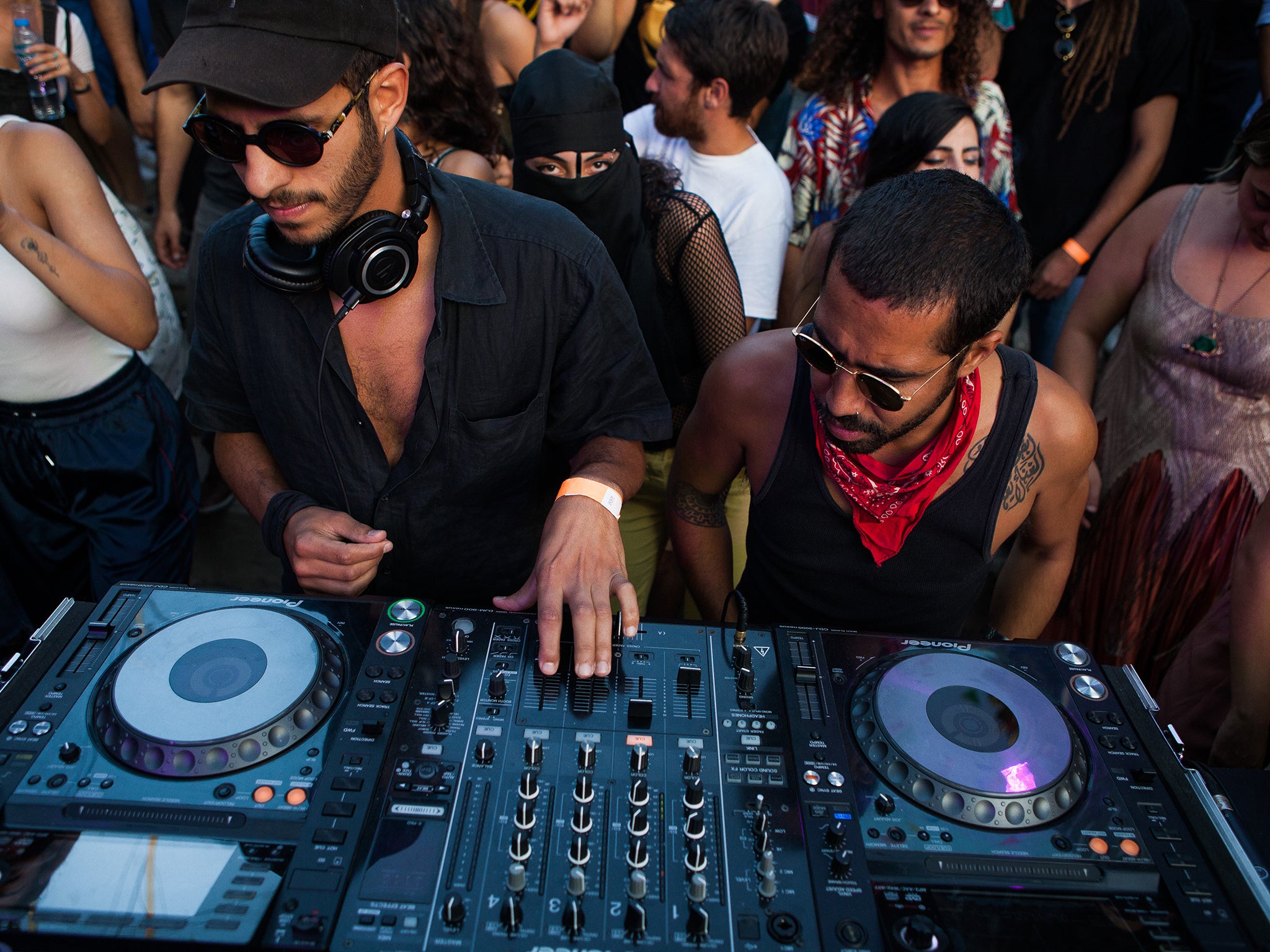
Oddz’s story in Palestine Underground follows him smuggling himself from Ramallah to Jafar, a Palestinian community in Tel Aviv, to play a set at Anna Loulou, a nightclub on the beach. In one scene, with a camera strapped to his head to give us a first-person view, Oddz scales an 8m high wall in Jerusalem, jumping through a gap in barbed wire and falling straight onto the concrete below. “I hurt my leg,” he reveals with a cheeky grin, “but it was worth it.”
Director Jessica Kelly shares her worries ahead of the film’s release, and the reaction from Israeli authorities on that particular moment. “I don’t think they are going to be massive fans of that,” she grimaces, “we also took the controversial decision to use the terms ‘Israel’, ‘occupied Palestine’ and ‘48’ interchangeably to reflect how the different contributors to the film refer to Israel. There are many Israelis who will see this is as a denial of Israel’s existence and take offence, but for us it was a device for the audience to understand what the contributors were saying.”
Our scene is newer, fresher, cosier than in Europe and I guess the oppression makes the party blast a bit harder
The scene with the fence highlights the separation between the two communities in the film. Oddz mumbles defiantly over the top of the opening sequence: “You can’t just build a wall and say, ‘you can’t do this’, it’s music, it’s for everyone.” Oddz is introduced to us while watering his plants and flicking through vinyls in his home in Ramallah.
The scene is cut-through with footage of frantic dancing and techno during his night in Anna Loulou. The venue is currently the only Palestinian venue in Jafar, and in an interview with the owner Marwan Hawash, he shares the importance of keeping Ramallah’s artists involved despite the danger of having to smuggle them into Israel. “The moment you see a DJ from Ramallah here in Jafar, it rings a bell for people. It makes them feel like the borders don’t matter, that we can break them.”
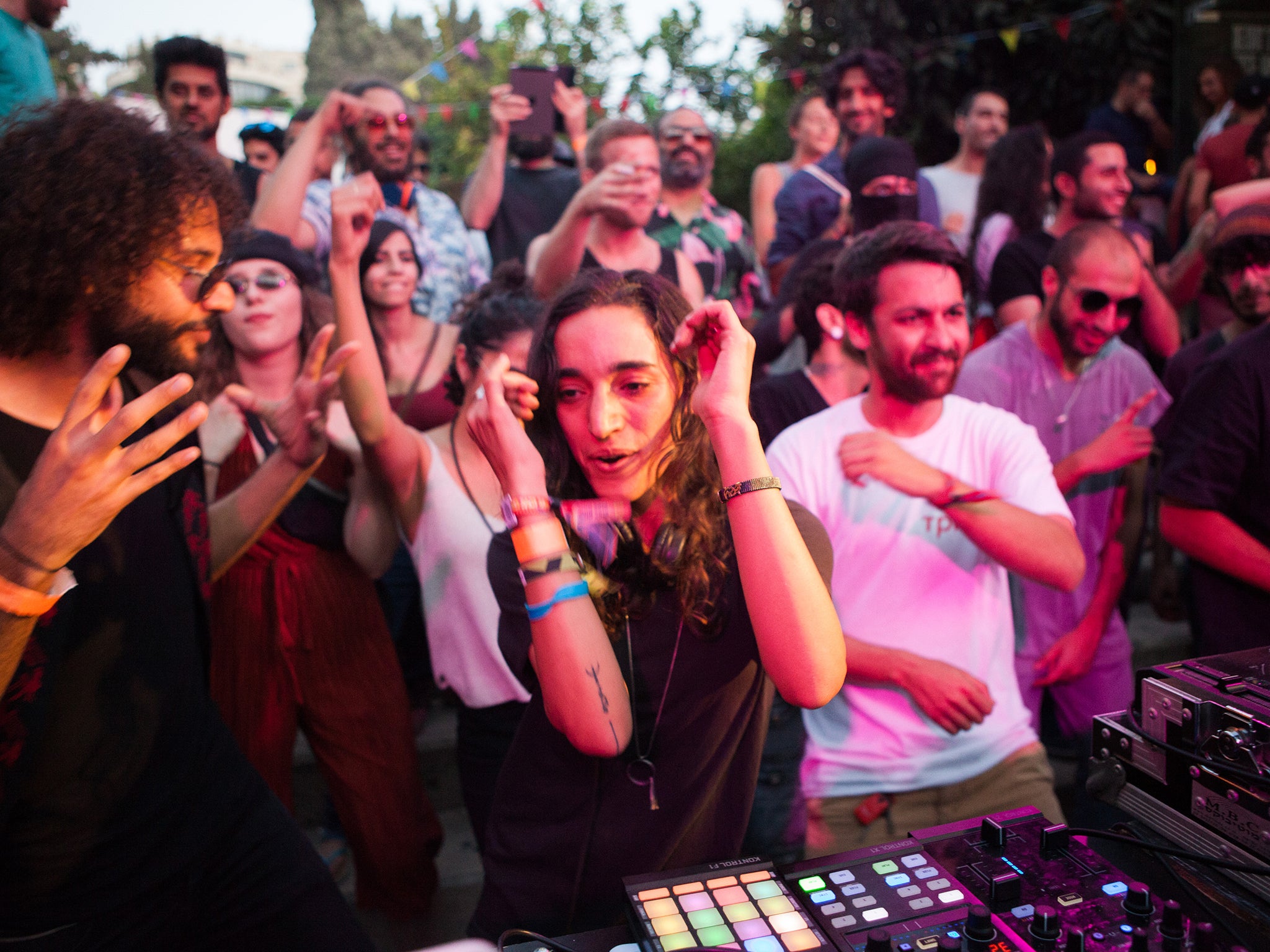
The warmth the DJs and producers in the scene seem to feel for Oddz is clear during his Boiler Room set. At least 20 people take turns embracing him as he steps up to the decks. The sound he plays is a fast-paced mix of hard European beats and bouncing African rhythms. It’s almost impossible for the crowd to keep up with him. But Oddz’s style of techno isn’t the only one coming from Ramallah. The first female Palestinian DJ to hold a solo Boiler Room set, Sama has been making waves since June for her use of synths inspired by the sounds of Detroit and Berlin.
I catch up with her after a show in Paris, where she has been living since the beginning of 2018. She insists that the parties in Europe are no better than those at home: “The dancing and the energy that people have at a party in Palestine has the same warmth as a party in Berlin. The only difference is that the number of people is much less and the place is much smaller. I usually find, in techno, that the vibe and energy from people all over the world is similar.” For Sama the decision to move to Paris was less about engaging with the techno she discovered at 19 in Ramallah, but instead to avoid the curfews that make parties difficult.
“Our scene is newer, fresher, cosier than in Europe and I guess the oppression makes the party blast a bit harder,” she laughs.
Since the Boiler Room set, Sama has seen a huge rise in the popularity of the Palestinian scene and interest in her as an artist. I ask her about the importance of the set and what it will mean for artists from her hometown in the future. “For Palestinians interested in electronic music, we’re not the strangers they shaped us to be. We resist with our music, together, we are the revolution.”
Palestine Underground can be viewed on Boiler Room 4:3
Subscribe to Independent Premium to bookmark this article
Want to bookmark your favourite articles and stories to read or reference later? Start your Independent Premium subscription today.
Join our commenting forum
Join thought-provoking conversations, follow other Independent readers and see their replies
Comments